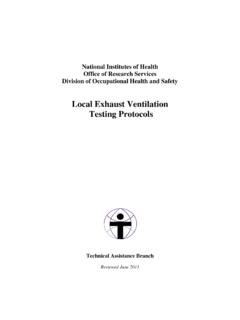Transcription of Complications of Diabetes - Pennington Biomedical Research ...
1 Page 1 Pennington Biomedical Research Center Pennington Nutrition Series Primary Care PhysicianCertified Diabetes EducatorDietitianPharmacistDentistEndocr inologistEye DoctorMental Health ExpertPerson with Diabetes & Family & FriendsPennington Nutrition Series Our mission is to discover the triggers of chronic diseases through innovative Research that improves human health across the lifespan.. Complications of Diabetes Diabetes is a chronic (or lifelong) disease that can result in both long term and short term Complications . Long term Complications are caused by years of high blood sugar levels in the blood vessels.
2 Risk of Complications increase the longer blood sugar levels are not under control. Many Diabetes Complications don't appear until after many years of having the disease. In the early stages, many long term Complications have no symptoms. Most of these Complications can be prevented or minimized with regular medical care and blood sugar monitoring. Emergency Complications are short term Complications and can be caused by very high (hyperglycemia) or very low(hypoglycemia) blood sugar levels in people with Diabetes . Diabetes care is a team approach to effectively help people cope with the vast array of Complications that can result from Diabetes .
3 Members of the Diabetes Care Team Potential Diabetes Complications : Heart disease Kidney disease Eye Complications Diabetic neuropathy and nerve damage Foot Complications Skin Complications Mental Health disorders Diabetic Emergencies Page 2 Pennington Biomedical Research Center Pennington Nutrition Series Heart and blood vessel disease are the most common long-term Complications of Diabetes . Coronary artery disease is caused by a narrowing or blocking of the blood vessels to the heart. It is the most common form of heart disease.
4 The blood vessels to the heart are important because the blood flowing through them carries oxygen and other necessary materials. Unfortunately, these blood vessels can become partially or totally blocked by fatty deposits. A heart attack occurs when the blood supply to the heart is reduced or cut off. People with Diabetes have a higher risk for some cardiovascular diseases, including: Heart attack (caused by a blockage of the blood vessels supplying blood to the heart) Stroke (caused by a blockage of the blood vessels supplying the brain) Blocked blood vessels in the legs and feet, which can lead to foot ulcers, infections, and even loss of a toe, foot, or lower leg Whether a person has Diabetes or not, the risk for these problems increase due to.
5 Smoking Obesity Abnormal levels of blood lipids (triglycerides or cholesterol) High blood pressure Family history of heart attack or stroke before age 50 How to reduce Risk of Complications : Knowing your ABCs A is for A1C A1C is the blood glucose check with a memory. It determines average blood glucose control over the past 2 to 3 months. The American Diabetes Association (ADA) recommends an A1C below 7. However, goals may be different for each individual. B is for blood pressure Blood pressure (BP) numbers are the force of blood inside the blood vessels.
6 With a high blood pressure, this means that the heart is having to work harder than it should. The ADA recommends a BP below 130/80. C is for cholesterol Cholesterol numbers are the amount of fat in the blood. Good cholesterol(HDL), help protect the heart. Bad cholesterol(LDL), can clog the blood vessels, leading to heart disease. Total Cholesterol <200mg/dL LDL < 100mg/dL HDL for men 40mg/dL or higher HDL for women 50mg/dL or higher Diabetes and Heart Disease Page 3 Pennington Biomedical Research Center Pennington Nutrition Series Diabetes & Kidney Disease Kidney disease or kidney damage often occurs over time in people with Diabetes .
7 This type of kidney disease is called diabetic nephropathy. The kidneys main job is to filter waste and extra water out of the blood to make urine. High levels of blood sugar can damage the blood vessels in the kidneys. When the blood vessels are damaged, they are not able to filter waste out of the blood. Many people with Diabetes also develop high blood pressure, which can also damage your kidneys. There are 5 stages of kidney disease. When kidney disease is caught early, there are treatments available to keep the kidney disease from getting worse.
8 Unfortunately, when kidney disease is diagnosed later, the stress from years of overworking the kidneys causes the kidneys to lose their filtering ability. This is called end-stage renal disease (ESRD) and treatment usually includes either a kidney transplant or dialysis. Risk Factors for Kidney Disease: High blood sugar levels High blood pressure Smoking Poor nutrition High salt diet Inactivity Overweight Family history Heart disease Ways to Reduce the Risk: Control blood sugar and blood pressure Take medications as prescribed Quit smoking Work with dietitian on meal plan Get enough sleep Maintain/get to healthy weight Symptoms: Kidney disease produces little to no symptoms until almost all function is gone.
9 The first symptom of kidney disease is usually fluid buildup. Other symptoms of kidney disease include loss of sleep, poor appetite, upset stomach, weakness, and difficulty concentrating. Testing is usually the only way to know if there is kidney disease. People with Diabetes should be tested every year if: Have been diagnosed with type 2 Diabetes Have been diagnosed with type 1 Diabetes for more than 5 years Page 4 Pennington Biomedical Research Center Pennington Nutrition Series Diabetes & Eye Complications Eyes can become damaged if blood sugar levels remain high over a period of time.
10 This can cause damage to the blood vessels in the back of the eyes. This leads to poor vision or blindness. Diabetes is the primary cause of blindness in adults. Types of Diabetic Eye Complications : 1. Blurry Vision High blood sugar and/or rapid changes in blood sugar levels can cause blurry vision. This is because the lens in the middle of the eye cannot change shape when it has too much sugar and water in the lens. This is not the same problem as diabetic retinopathy and usually corrects itself when blood sugar levels normalize. 2. Retinopathy Retinopathy is caused by damage to the blood vessels of the Retina (the layer of tissue at the back of the eye.)



